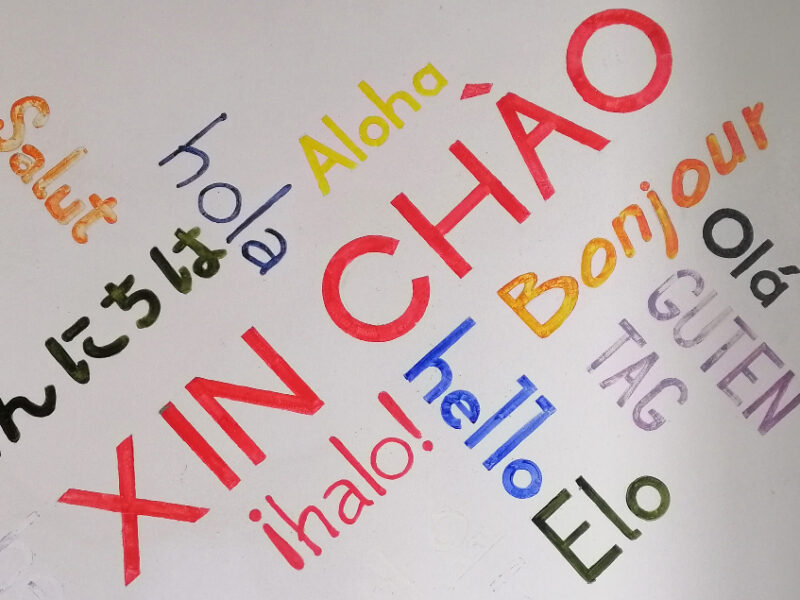After virtual teleportation up and across the grand globe, and finally touching down in Southeast Asia’s humongous hub of Bangkok, I was unsurprisingly bombarded with the Thai language.
Bangkok is a city of around 15 million people, so there’s no shortage of eavesdropping possibilities. There are endless talkative Thais in the country’s steamy mega city. Add another 55 million outside the colossal capital and there’s no shortage of tonal Thai to take in.
After spending the majority of the last year in Spanish speaking countries, the ability to function in the local tongue was taken for granted. Now, in the former Siam, since my arsenal of Thai words is close to non existent, I mindfully realize that language ability is a big benefit.
One way to elicit a genuine smile from a local is to attempt to verbalize Thai words. Imagine a foreign person in your country. You expect them to speak English or your local tongue. It’s probably not any different the way locals in Thailand see foreigners.
In a tremendous tourist zone like Chiang Mai, English is widely spoken.
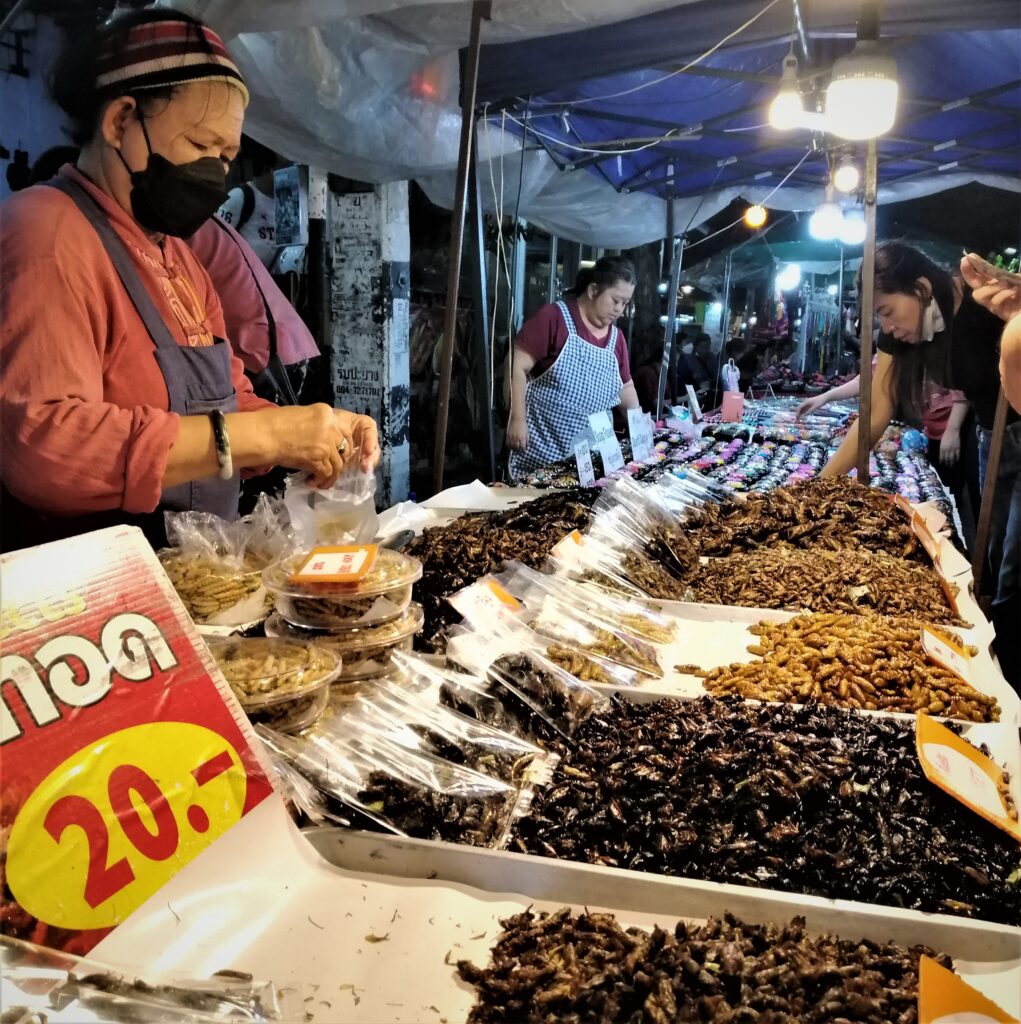
I felt the need to start somewhere with the language. Every evening here in Thailand, now in Chiang Mai, I eat mostly in night markets.
So I dove into food-related words that enable communication in Thai. Any words conveyed will enhance the momentary experience with positive vibrations.
New words will only multiply.
Most locals appreciate the effort. Some will help with pronunciation and give you better ways of saying things, while others might look at you with complete apathy.
10 Food-Related Thai Words & How to Remember Them
1.) food = ahan
Two syllables – a han
I imagine eating too much food, so I need a hand eating it.
Now if a Thai person asks me what I’m looking for. I can say: Ahan (food).
—————————————————————————–
2.) eat = gin
One syllable – gin (soft g)
Imagine a bottle of the alcohol gin, pronounced with a hard g. We don’t eat gin, we drink it.
If I wish to tell someone that I want to eat something, I say: gin. It is the same pronunciation as the g in gift.
—————————————————————————-
3.) pineapple = saparot
Three syllables – sa pa rot.
Imagine biting into a chunk of fresh, juicy tropical pineapple, and of a tree and its sap. Then a piece of pineapple with tree sap on it. Next I say to myself, this is not rote learning. Sap a rot. The last syllable in saparot is pronounced the same as rote.
When I order a bag of sliced pineapple from a street vendor, I say: Saparot. This is more enjoyable than saying pineapple or only pointing. Try it. The action may cause you and the fruit hawker to smile or laugh simultaneously.
Linguisticly, pineapple is an interesting word. It translates to ananas in Arabic, French, Japanese, Norwegian and Portuguese. But in Thai, like in English and Spanish, pineapple doesn’t translate to ananas.
—————————————————————————–
4.) banana = gluay
Two syllables – glue ay
Imagine a strange dream. You’re trying to peel a banana but the peel is glued to the banana so it can’t be peeled. Glue ay. Reverse that. Ay or I can’t eat the banana because the peel is glued to it. It’s so strange that it is hard to forget. Now when I want to buy bananas, I say: Gluay.
Like other tonal languages in the region, Thai doesn't use a plural form for nouns.
In a touristy area, the vendor will notice your Thai language attempt since the vast majority of foreign tourists will use the English word. You may be that one-in-a-hundred individual who puts in the small effort to spew out a local word. This joyful endeavor brings about good vibes.
—————————————————————————–
5.) spinach = pak kom
Two syllables – pak kom
Imagine my friend Paco. He’s coming over to eat and is bringing a spinach dish. Pa kom.
Pahk is the word for vegetable. It’s easy to remember after learning spinach, pakkom.
—————————————————————————–
6.) spicy = pedt
One syllable – pedt
Imagine cats and dogs. They’re pets who don’t like spicy food.
Now when I order food I say: pet. People in Thai eateries around tourist zones won’t make the food spicy for foreigners. However, saying pet will ensure your food has more chili than it otherwise would have. If you don’t want it spicy you can say: Mai pedt. Mai = no / not.
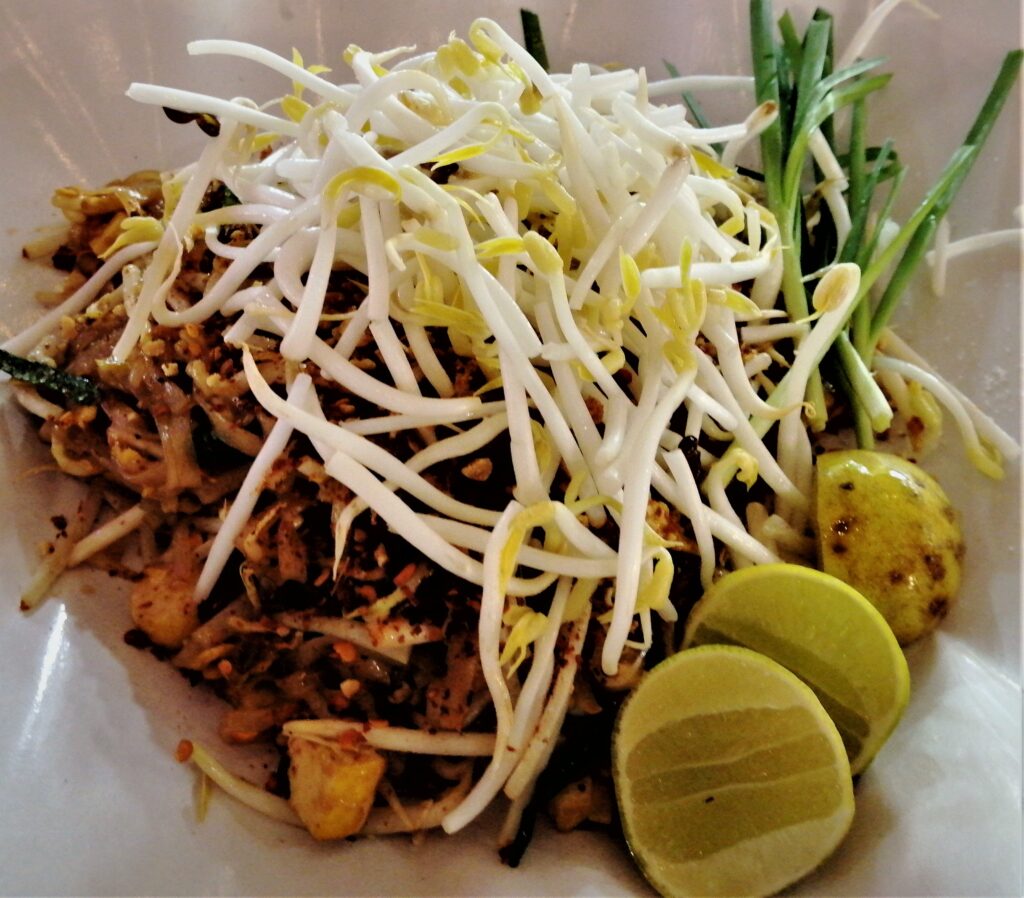
7.) chili = prik
One syllable – prik
Imagine a thorn in the hot jungle that pricked your leg. You were sweating profusely from the heat, like when eingat an overabundance of prik or chili.
If you like spicy food then give this one a whirl when you’re in Thailand or at that local Thai restaurant that’s staffed with Thai or Lao people.
—————————————————————————–
8.) salt = kem
One syllable – kem (just like it looks)
Imagine being in chemistry class. I vaguely remember learning that salt is a chemical compound. I’m usually not a fan of salt so I sometimes say: Mai kem (no salt) if I think salt might be added to my ahan (food).
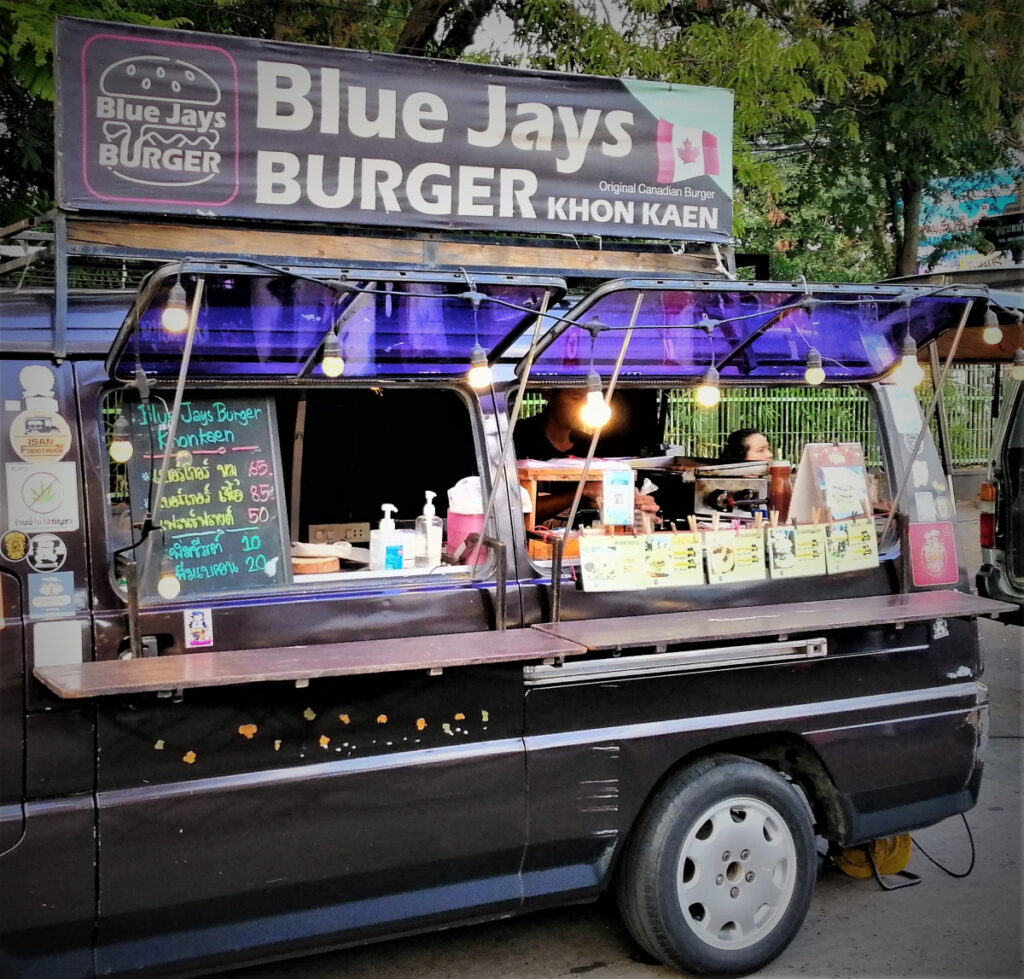
9.) vegan = jae
One syllable – like the letter J
I imagine a blue jay. Earthy crunchy vegans don’t eat blue jays.
Abstinence from flesh food can be more challenging while drifting the earth, so jae comes in handy in a sea of eateries that dominate towns and cities of this cuisine-friendly society.
Pom jae = I am vegan. Pom = I. They tend to do their best to accommodate. While vegetarianism and veganism are easier to employ in touristy areas, all towns have great, inexpensive little mom & pop vegetarian restaurants for devout Buddhists who don’t eat flesh food.
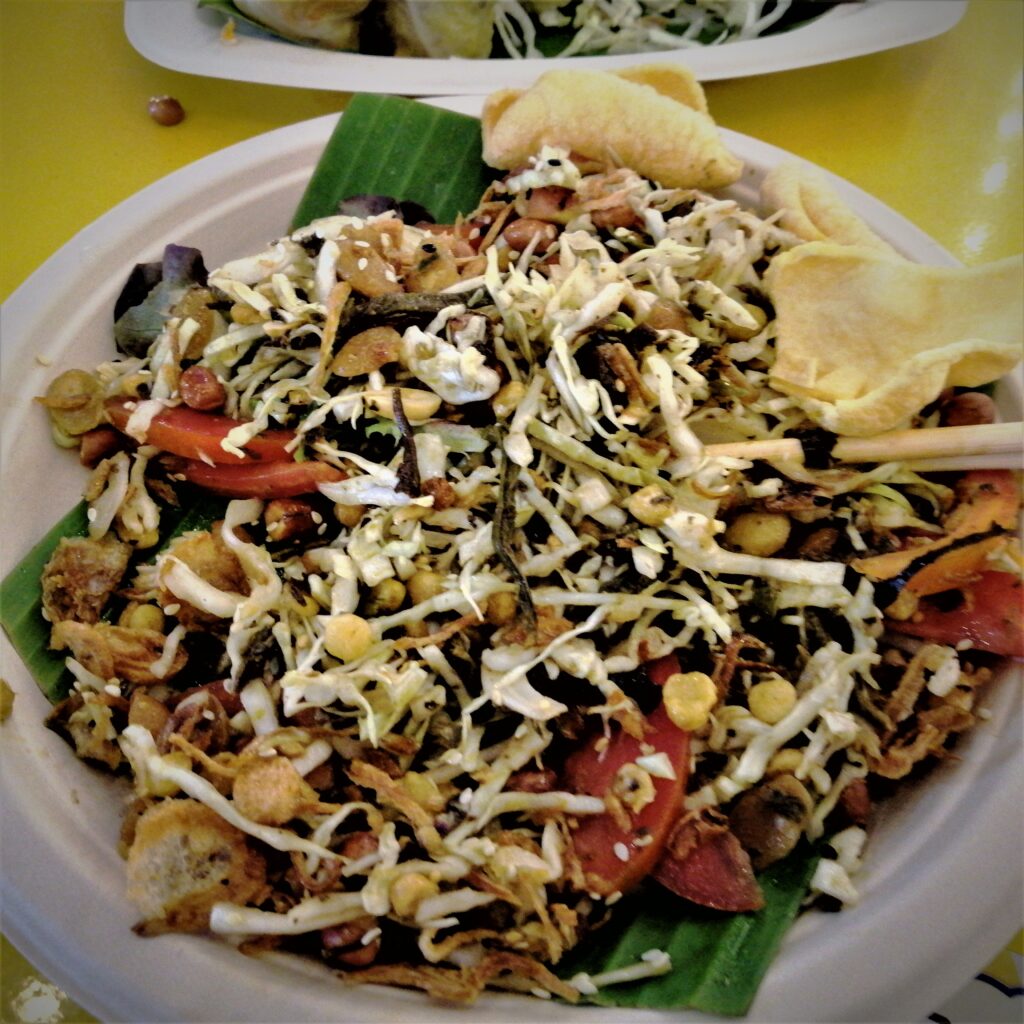
10.) delicious = aloy
Two syllables – a loy
Imagine putting your tongue on some alloy metal. It is not delicious, but Thai food is aloy, the opposite of what alloy metal is if you were to put your tongue on it.
When you take a bite of something you’ve bought on the street, it is often aloy. Say this to the hard-working hawker and you’re likely to get a Thai smile. This makes having learned the word worthwhile.
I have never met a person who doesn’t find Thai food aloy (delicious).
Conclusion
If you’re in search of a few Thai food words, then this has probably helped. And ideally it will motivate us to learn more. The application of applying mnemonics through imagination can be used to learn anything.
Shout out to Matteo Salvo for sharing his passion for mnemonics while helping him with his English about a decade and a half ago. My gosh. Time flies. So the time to begin studying a language, or anything, is now.
Have you used any interesting associations to enhance vocabulary building in another language? Feel free to leave a comment below.


